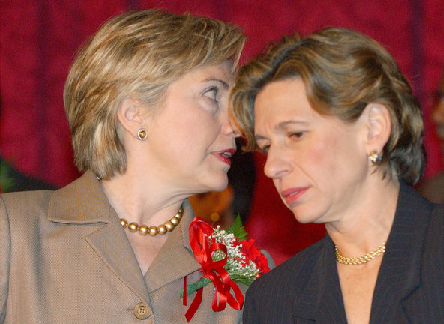 On July 11 the AFT announced its Executive Council “overwhelmingly” endorsed Hillary Clinton for the Democratic nomination for President. It did so, the official announcement reported, on the basis of interviews (not released to members) and the results of a poll.
On July 11 the AFT announced its Executive Council “overwhelmingly” endorsed Hillary Clinton for the Democratic nomination for President. It did so, the official announcement reported, on the basis of interviews (not released to members) and the results of a poll.
AFT's endorsement of Clinton: An undemocratic decision that should be reversed
Puerto Rico’s New Party of the Working People Fights Austerity
 The Partido del Pueblo Trabajador—the Party of the Working People (PPT)—is a political project of the Puerto Rican left addressed to working people in the context of the island’s deep economic crisis.
The Partido del Pueblo Trabajador—the Party of the Working People (PPT)—is a political project of the Puerto Rican left addressed to working people in the context of the island’s deep economic crisis.
Sanders and the Middle East
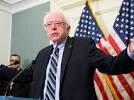 Regardless of one's views on whether or not the socialist left should support Bernie Sanders in his race for the White House, the momentum behind the self-described “democratic socialist” has been impressive. Beginning at 2% in April, his popularity grew to 14% in May and at last check was 32% in New Hampshire.
Regardless of one's views on whether or not the socialist left should support Bernie Sanders in his race for the White House, the momentum behind the self-described “democratic socialist” has been impressive. Beginning at 2% in April, his popularity grew to 14% in May and at last check was 32% in New Hampshire.
Assessing the Sanders Campaign
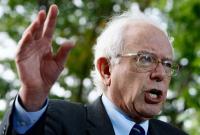 How are we to assess the Bernie Sanders presidential campaign?
How are we to assess the Bernie Sanders presidential campaign?
There are three reasons that one runs a candidate for president. One is the hope of winning, second is to influence other candidates to modify their views, and third is to use the campaign to build for the future, either educationally or organizationally.
Over 1,000 local union leaders and members back Bernie Sanders for President
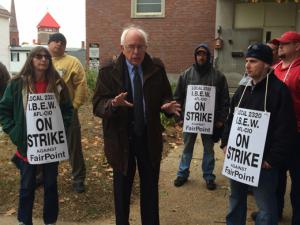
Grassroots labor initiative urges Democratic primary support for Sanders by AFL-CIO and national unions.
Over 1,000 union activists from around the country today kicked off Labor for Bernie 2016.
The Meaning of the Election in Turkey
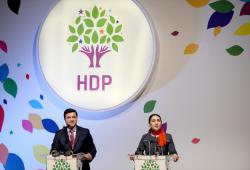
In the weeks leading up to the June 7 parliamentary election in Turkey communities across the country were gripped with a mixture of excitement, anxiety, and fear. Though President Tayyip Recep Erdoğan was supposed to be above the fray of party politics, the former two-term prime minister and co-founder of the Justice and Development Party (AKP) made no secret of his hopes for an AKP victory, as he rallied and spoke continuously in the weeks and months before the election. 367 seats in the 550-member parliament would make possible Erdoğan’s desire to change the Turkish government from a parliamentary to a presidential system, thereby enhancing executive, and Erdoğan’s, grip on political power.
Electoral Amnesia in Argentina
[Introduction by Todd Chretien: In the run-up to Argentina's national elections in October, a scramble for power has divided the incumbent Peronista party into warring factions. Founded by Juan Perón in 1946, the Partido Justicialista ruled through sometimes radical nationalism, state intervention in the economy, clientelist patronage and control over trade unions, and the loyalty of sections of the bourgeoisie and an elite political class of bureaucrats.
Mexican President and his Party Victorious in Election; Left Divided and Defeated
Despite widespread d isillusionment with the political system, an organized attempt to prevent the election from taking place in a few states, and continuing economic doldrums, President Enrique Peña Nieto and his Institutional Revolutionary Party (PRI) were the big winners in the Mexican election, followed by the conservative National Action Party (PAN).
isillusionment with the political system, an organized attempt to prevent the election from taking place in a few states, and continuing economic doldrums, President Enrique Peña Nieto and his Institutional Revolutionary Party (PRI) were the big winners in the Mexican election, followed by the conservative National Action Party (PAN).
Sanders and Independent Politics
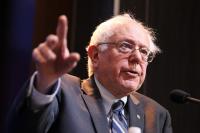 Despite his relatively low poll numbers at the moment, Bernie Sanders’ bid for the Democratic presidential nomination is catching fire and will undoubtedly attract a great many more supporters in the months to come. For radicals, and especially for socialists in the “third camp” tradition (so called from the time of the Cold War, when our tendency stood for revolutionary opposition to both camps) this poses a challenge.
Despite his relatively low poll numbers at the moment, Bernie Sanders’ bid for the Democratic presidential nomination is catching fire and will undoubtedly attract a great many more supporters in the months to come. For radicals, and especially for socialists in the “third camp” tradition (so called from the time of the Cold War, when our tendency stood for revolutionary opposition to both camps) this poses a challenge.
What Went Wrong–and Why
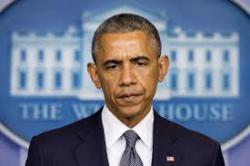
So why did things go so wrong under the leadership of President Barack Obama? David Bromwich has written an informative and important critical article on the Obama presidency, critical one might say from the progressive point of view, titled “What Went Wrong: Assessing Obama’s Legacy” which appears in the June issue of Harper’s. Fundamentally, Bromwich sees Obama as a weak president who has consistently pursued the “path of least resistance” rather than the “path of courageous resistance.” He was, says Bromwich, a president who mistook talk for action, who avoided political conflict and struggle, and who missed opportunities that presented themselves, moments when he might have advanced a progressive agenda.
Violence and Protests Derail Mexican Elections as Left Divided

Mexico’s latest elections are threatened by drug cartel violence, social protests, and the mass resignation of election officials. The left, which in the past has succeeded in rallying a third or more of the nation’s voters for a single party, goes into this election deeply divided, prompting expectations of a win for the ruling party.
A hurricane is barreling down on Baja California threatening to interfere with Mexico’s June 7 elections on the peninsula, but the far greater storm is the combination of criminal violence and widespread social protests, which could disrupt and possibly prevent the election in several states.
Bernie Sanders as I've Known Him
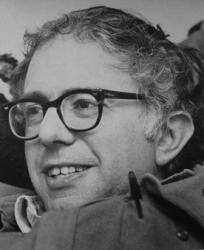
I haven’‘t had a chance yet to write up my own view of the Bernie Sanders campaign, but I want to give some background, going back to 1980, on what I know about the man.
In 1980 I was in Vermont trying to get on the ballot for the Presidential campaign – seeking the line of Liberty Union, a minor party which had hoped to become a ‘‘second party” in Vermont.
Liberty Union’s own history goes back to the late 1960’s when there was an effort in several states, at the height of the Vietnam War, to get alternative radical views on the ballot. The main base for this effort was in California, with the Peace and Freedom Party which, in 1968, nominated Eldridge Cleaver for President. (I ran for Congress in Lower Manhattan on that ticket that year, picking up the endorsement of the Village Voice and getting nearly 5% of the vote).
A Socialist FAQ on Bernie Sanders and the Left

The following introduction is by the editors of SocialistWorker.org where this FAQ was originally published.
Bernie Sanders kicked off his campaign for the Democratic Party presidential nomination with a large and enthusiastic rally in Burlington, Vermont, on May 26.
Sanders’ candidacy has prompted discussion and debate among a left shaped by recent struggles such as Occupy Wall Street, the Chicago teachers strike, Fight for 15, Black Lives Matter and the climate justice movement. Many radicals, publications and organizations either support Sanders’ Democratic Party run outright or believe his campaign can be used to build the infrastructure for a stronger left. By contrast, SocialistWorker.org has argued Sanders’ campaign will serve to corral and co-opt the emerging left into supporting the Democratic Party–and make it harder, not easier, to build an independent, left-wing alternative.
Here, Ashley Smith and Alan Maass respond to some of the questions and disagreements posed by SocialistWorker.org readers during the course of the discussion so far.
Bernie Sanders is no Eugene Debs
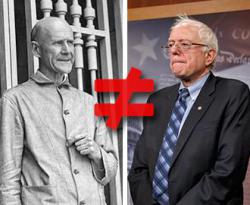
Bernie Sanders’ entry into the Democratic presidential primaries should be seen as his final decisive step away from the democratic socialism he professes to support. He will raise some progressive demands in the primaries and then endorse the corporate Democrat, Hillary Clinton. Nothing changes.
Sanders is violating the first principle of socialist politics: class independence. The socialist movement learned that principle long ago when the business classes sold out the workers in the democratic revolutions of 1848 that swept across Europe and parts of Latin America.
The Sanders Campaign and the Democratic “Party”
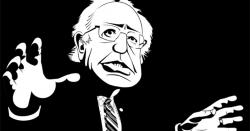
I appreciate the nonsectarian tone of the piece on Bernie Sanders’ presidential campaign by my longtime fellow New Politics editorial board member and friend Barry Finger. I think he has a better, more sophisticated understanding of the peculiarities of the Democratic Party (DP) and the U.S. electoral system than do many on the radical left that refuse to support any DP candidate regardless of that candidate’s personal political platform. However, I think that Barry still suffers from certain misunderstandings regarding just how different the big two U.S. political parties are from political parties that exist anywhere else in the world, and this means there are defects in his suggestions as to how left-wing socialists should relate to the Sanders campaign.
The Left Divided as Mexicans go to the Polls on June 7
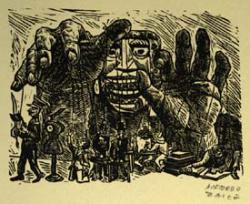
The Mexican left is more divided than at any time since the early 1980s as some 80 million Mexican voters will go to the polls on June 7 to elect 500 federal representatives, nine governors 641 state legislators, 993 mayor and 16 borough chiefs in Mexico City.
Four rival leftist parties will be competing for votes—the Party of the Democratic Revolution (PRD), the Workers Party (PT), the Citizens Movement (MC), and the Movement for National Regeneration Party (MORENA)—though is some cases they will ally with each other and in others with one of the two dominant parties: the Institutional Revolutionary Party (PRI) or the National Action Party (PAN). The Zapatista Army of National Liberation (EZLN), one of the country’s important left organizations, remains opposed to elections as always. Some in the Ayotzinapa protest movement—protesting over the killing of six and disappearance of 43 students at a rural teachers college in Guerrero–have called upon voters to abstain altogether.
Campaigning With Bernie, Then and Now: Why Labor Should Give Sanders Strong Primary Election Support

When I first met Brooklyn-born Bernie Sanders, he was a pretty marginal figure in his adopted state of Vermont. It was 1976 and he was running, unsuccessfully and for the fourth time, as a candidate of the Liberty Union Party (LUP).
Never heard of it? Well that’s understandable because only Vermonters are still afflicted with its enduring flakiness. Liberty Union (LUP) was a radical third party spearheaded by opponents of the Vietnam War who had, like Bernie, washed up in the Green Mountain State as “the Sixties” subsided.
The Future of Podemos
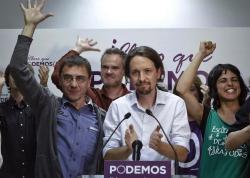
Podemos can still change Spain for the better. But it won’t do so by chasing the political center.
The strategic debate inside Podemos has become a public issue. Pablo Iglesias, the leader of the Spanish party, even recently jumped into the discussionwith an article explicitly inspired by Antonio Gramsci. But beyond the direct leadership of the party, the strategy debate involves something that pertains to everyone — to the scores of people and social sectors who desire a profound transformation of the Spanish political reality.
Three Conferences and a Postscript

Dan La Botz’s description of the Future of the Left/Independent Politics Conference makes another introduction redundant. Instead, I’ll add my own observations. I come from the other side of this discussion: I hold with the `inside/outside’ approach to electoral politics, as pushed by the late Arthur Kinoy, a radical lawyer who led the National Committee for Independent Political Action in the 70s and 80s. Putting it simply, I supported left independent Barry Commoner for president in 1980, and Democrat Harold Washington for mayor of Chicago in 1983. This year, I support Kshama Sawant and Bernie Sanders. I see no contradiction – in fact I think it’s the only approach that makes sense.
Electoral Guide 2016
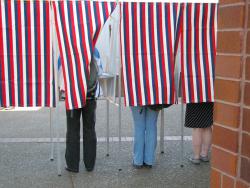
Any discussion of this subject needs to be based on the understanding that, at present, voting is carefully designed to, in Chomsky's words "reduce the population to apathy and obedience", putting us in a position where we are forced to demonstrate our fealty to the corporate state by actively endorsing one of its two anointed representatives.
